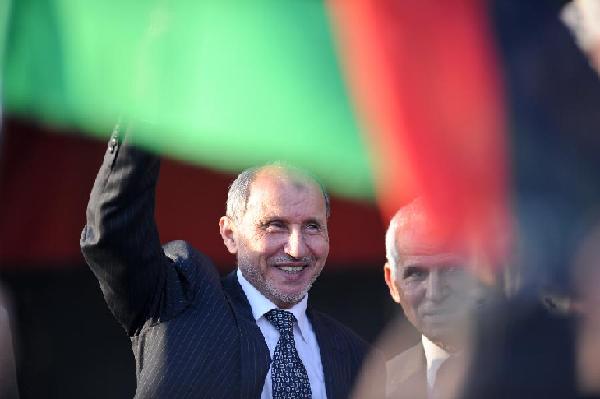Libya declares liberation
 0 Comment(s)
0 Comment(s) Print
Print E-mail
China.org.cn, October 24, 2011
E-mail
China.org.cn, October 24, 2011
Libyan ruling National Transitional Council (NTC) declared on Sunday that Libya has been "liberated" following a speech by NTC chairman Mustafa Abdul-Jalil.
 |
|
Chairman of the Libyan ruling National Transitional Council (NTC) Mustafa Abdul-Jalil gestures during the celebration ceremony at the main Square in Benghazi, Libya, Oct. 23, 2011. The NTC Vice Chairman Abdel Hafiz Ghoga Sunday declared here that Libya has been "liberated" from the regime of Muammar Gaddafi. [Photo/Xinhua] |
"Declaration of Liberation. Raise your head high. You are now in a free Libya," said NTC Vice Chairman Abdel Hafiz Ghoga to a cheering crowd in Benghazi's Liberation Square, formerly called Martyrs' Square.
The formal declaration came three days after NTC forces took over Sirte, the last stronghold of Muammar Gaddafi?loyalists?and the capture and death of Gaddafi the same day.
The announcement, made in Libya's second largest city Benghazi, where anti-Gaddafi protests started in February, marks the end of the eight-month-old domestic fighting between Gaddafi's loyalists and the NTC fighters.
Addressing a huge crowd at the main square in the eastern city of Benghazi, Jalil congratulated the Libyan people on their gaining liberation, and expressed gratefulness to all Libyans who have contributed their efforts in the fight.
Jalil meanwhile called on the Libyan people to abide by the law, be patient and tolerant, and avoid resorting to forces in obtaining power, and asked them to safeguard the order and security of the country.
The top leader of NTC also reiterated that the Islamic sharia would be the main source of the law of new Libya, and any law contradicts with the Islamic sharia would be suspended.
The future of Libya will be created by the Libyan people, Jalil stressed.
During his speech, Jalil also remembered many of the NTC fighters who lost their lives in the fight against Gaddafi's forces over the past months.
Since Sunday afternoon, thousands of citizens in Benghazi have started to gather at the Liberation Square to hear in person the official announcement of the country's "liberation." The city has been in jubilation since Saturday, as a welcoming ceremony for the front-line fighters went on deep into the night.
Ghoga took the podium after NTC Chairman Mustafa Abdel Jalil addressed the crowd, calling for national unity and voicing hope for a better future for the new Libya.
The square has by now turned into a party place for people in festivity, as well as a sea of the tricolor NTC flags, which has in last month replaced the Gaddafi-era green national flag at the United Nations headquarters.
While almost everyone keeps chanting patriotic slogans and songs, many are holding the photos of their relatives or friends, who have sacrificed their lives in the prolonged fighting in the North African nation.
In the meantime, massive voluntary celebrations, including firework shows, are being held in other Libyan cities including the capital Tripoli and Misrata, where Gaddafi's corpse was still put on display to local citizens as of early Sunday.
By now, no concrete decision has been reportedly reached over Gaddafi's burial, as the United Nations has required a thorough investigation into his death to see whether the former leader was shot dead purposely by the NTC fighters who captured him alive.
Speaking to reporters earlier Sunday in Jordan, Mahmoud Jibril, head of the NTC's executive committee said an interim Libyan government will be formed within a month to run the country's affairs.
"There is work currently to form an interim government from one week to a month and there will be also hard work to minimize the time needed to hold elections to select the parliament," said the NTC's de facto prime minister, who is in Amman attending the World Economic Forum.
The formation of a new government in Libya has been postponed repeatedly due to differences among factions within the NTC, formed by anti-Gaddafi forces not long after the revolt erupted in Benghazi.
Gaddafi's death and the withdrawal of NATO forces, which is expected at the end of October, will leave a period of power vacuum in Libya, raising fears that clashes among different ethnic groups trying to seize power may broke out.





